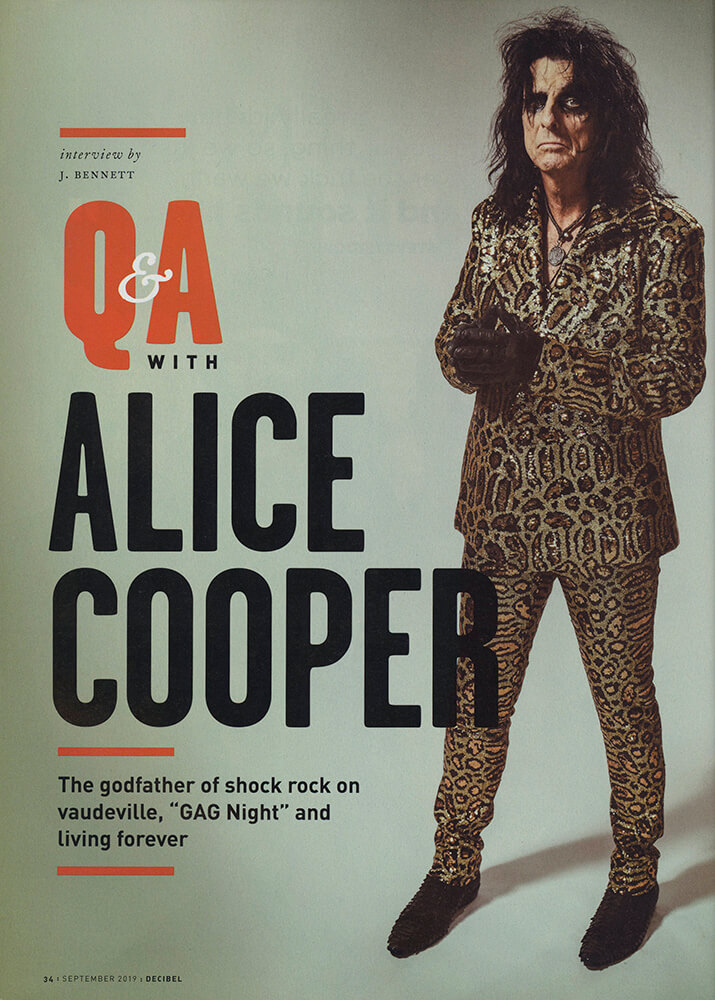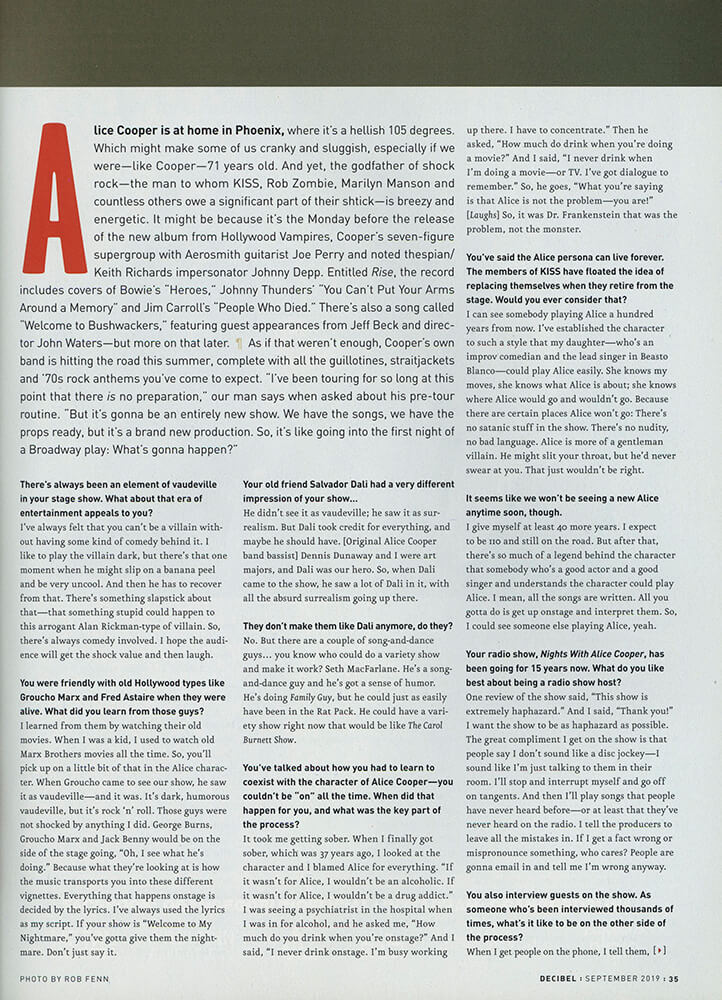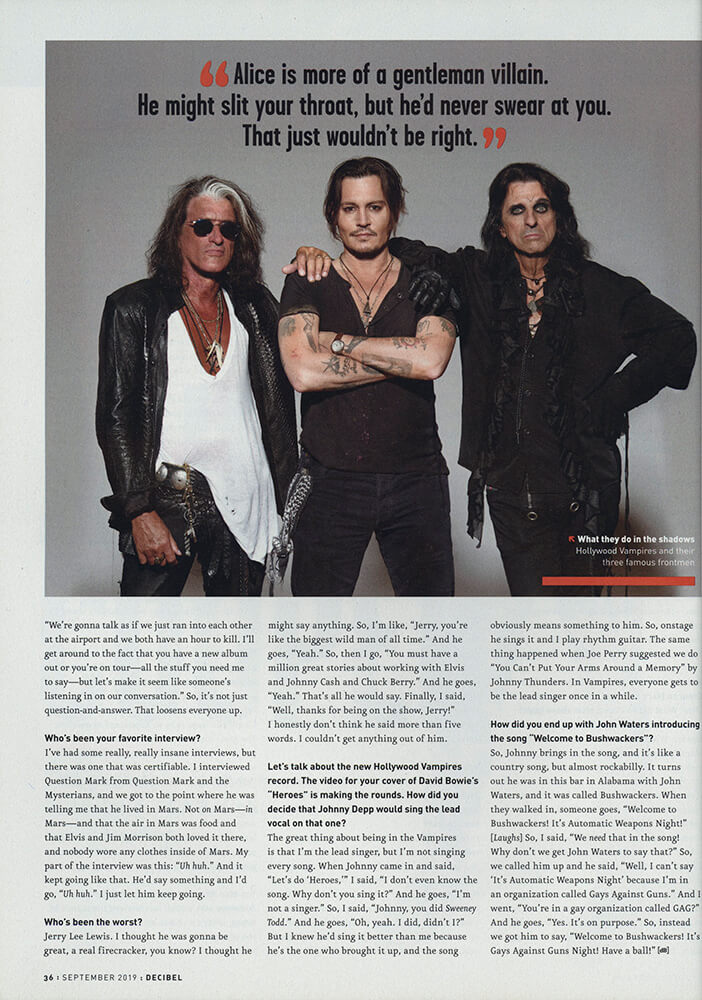Article Database
Q&A with Alice Cooper
The godfather of shock rock on vaudeville "GAG Night" and living forever
Alice Cooper is at home in Phoenix, where it's a hellish 105 degrees. Which might make some of us cranky and sluggish, especially if we were — like Cooper — 71 years old. And yet, the godfather of shock rock-the man to whom KISS, Rob Zombie, Marilyn Manson and countless others owe a significant part of their shtick — is breezy and energetic. It might be because it's the Monday before the release of the new album from Hollywood Vampires, Cooper's seven-figure supergroup with Aerosmith guitarist Joe Perry and noted thespian/Keith Richards impersonator Johnny Depp. Entitled Rise, the record includes covers of Bowie's "Heroes," Johnny Thunders "You Can't Put Your Arms Around a Memory" and Jim Carroll's "People Who Died." There's also a song called "Welcome to Bushwackers," featuring guest appearances from Jeff Beck and director John Waters — but more on that later. As if that weren't enough, Cooper's own band is hitting the road this summer, complete with all the guillotines, straitjackets and '70s rock anthems you've come to expect. "I've been touring for so long at this point that there is no preparation," our man says when asked about his pre-tour routine. "But it's gonna be an entirely new show. We have the songs, we have the props ready, but it's a brand new production. So, it's like going into the first night of a Broadway play: What's gonna happen?"
There's always been an element of vaudeville in your stage show. What about that era of entertainment appeals to you?
I've always felt that you can't be a villain without having some kind of comedy behind it. I like to play the villain dark, but there's that one moment when he might slip on a banana peel and be very uncool. And then he has to recover from that. There's something slapstick about that — that something stupid could happen to this arrogant Alan Rickman — type of villain. So, there's always comedy involved. I hope the audience will get the shock value and then laugh.
You were friendly with old Hollywood types like Groucho Marx and Fred Astaire when they were alive. What did you learn from those guys?
I learned from them by watching their old movies. When I was a kid, I used to watch old Marx Brothers movies all the time. So, you'll pick up on a little bit of that in the Alice character. When Groucho came to see our show, he saw it as vaudeville — and it was. It's dark, humorous vaudeville, but it's rock 'n' roll. Those guys were not shocked by anything I did. George Burns, Groucho Marx and Jack Benny would be on the side of the stage going, "Oh, I see what he's doing." Because what they're looking at is how the music transports you into these different vignettes. Everything that happens onstage is decided by the lyrics. I've always used the lyrics as my script. If your show is "Welcome to My Nightmare," you've gotta give them the nightmare. Don't just say it.
Your old friend Salvador Dali had a very different impression of your show...
He didn't see it as vaudeville; he saw it as surrealism. But Dali took credit for everything, and maybe he should have. [Original Alice Cooper band bassist] Dennis Dunaway and I were art majors, and Dali was our hero. So, when Dali came to the show, he saw a lot of Dali in it, with all the absurd surrealism going up there.
They don't make them like Dali anymore, do they?
No. But there are a couple of song-and-dance guys... you know who could do a variety show and make it work? Seth Macfarlane. He's a song-and-dance guy and he's got a sense of humor. He's doing Family Guy, but he could just as easily have been in the Rat Pack. He could have a variety show right now that would be like The Carol Burnett Show.
You've talked about how you had to learn to coexist with the character of Alice Cooper — you couldn't be "on" all the time. When did that happen for you, and what was the key part of the process?
It took me getting sober. When I finally got sober, which was 37 years ago, I looked at the character and I blamed Alice for everything. "If it wasn't for Alice, I wouldn't be an alcoholic. If it wasn't for Alice, I wouldn't be a drug addict." I was seeing a psychiatrist in the hospital when I was in for alcohol, and he asked me, "How much do you drink when you're onstage?" And I said, "I never drink onstage. I'm busy working up there. I have to concentrate." Then he asked, "How much do you drink when you're doing a movie?" And I said, "I never drink when I'm doing a movie — or TV. I've got dialogue to remember." So, he goes, "What you're saying is that Alice is not the problem — you are!" [Laughs] So, it was Dr. Frankenstein that was the problem, not the monster.
You've said the Alice persona can live forever. The members of KISS have floated the idea of replacing themselves when they retire from the stage. Would you ever consider that?
I can see somebody playing Alice a hundred years from now. I've established the character to such a style that my daughter — who's an improv comedian and the lead singer in Beasto Blanco — could play Alice easily. She knows my moves, she knows what Alice is about; she knows where Alice would go and wouldn't go. Because there are certain places Alice won't go: There's no satanic stuff in the show. There's no nudity, no bad language. Alice is more of a gentleman villain. He might slit your throat, but he'd never swear at you. That just wouldn't be right.
It seems like we won't be seeing a new Alice anytime soon, though.
I give myself at least 40 more years. I expect to be no and still on the road. But after that, there's so much of a legend behind the character that somebody who's a good actor and a good singer and understands the character could play Alice. I mean, all the songs are written. All you gotta do is get up onstage and interpret them. So, I could see someone else playing Alice, yeah.
Your radio show, Nights With Alice Cooper, has been going for 15 years now. What do you like best about being a radio show host?
One review of the show said, "This show is extremely haphazard." And I said, "Thank you!" I want the show to be as haphazard as possible. The great compliment I get on the show is that people say I don't sound like a disc jockey — I sound like I'm just talking to them in their room. I'll stop and interrupt myself and go off on tangents. And then I'll play songs that people have never heard before — or at least that they've never heard on the radio. I tell the producers to leave all the mistakes in. If I get a fact wrong or mispronounce something, who cares? People are gonna email in and tell me I'm wrong anyway.
You also interview guests on the show. As someone who's been interviewed thousands of times, what's it like to be on the other side of the process?
When I get people on the phone, I tell them, "We're gonna talk as if we just ran into each other at the airport and we both have an hour to kill. I'll get around to the fact that you have a new album out or you're on tour — all the stuff you need me to say — but let's make it seem like someone's listening in on our conversation." So, it's not just question-and-answer. That loosens everyone up.
Who's been your favorite interview?
I've had some really, really insane interviews, but there was one that was certifiable. I interviewed Question Mark from Question Mark and the Mysterians, and we got to the point where he was telling me that he lived in Mars. Not on Mars — in Mars — and that the air in Mars was food and that Elvis and Jim Morrison both loved it there, and nobody wore any clothes inside of Mars. My part of the interview was this: "Uh huh." And it kept going like that. He'd say something and I'd go, "Uh huh." I just let him keep going.
Who's been the worst?
Jerry Lee Lewis. I thought he was gonna be great, a real firecracker, you know? I thought he might say anything. So, I'm like, "Jerry, you're like the biggest wild man of all time." And he goes, "Yeah." So, then I go, "You must have a million great stories about working with Elvis and Johnny Cash and Chuck Berry." And he goes, "Yeah." That's all he would say. Finally, I said, "Well, thanks for being on the show, Jerry!" I honestly don't think he said more than five words. I couldn't get anything out of him.
Let's talk about the new Hollywood Vampires record. The video for your cover of David Bowie's "Heroes" is making the rounds. How did you decide that Johnny Depp would sing the lead vocal on that one?
The great thing about being in the Vampires is that I'm the lead singer, but I'm not singing every song. When Johnny came in and said, "Let's do 'Heroes,"' I said, "I don't even know the song. Why don't you sing it?" And he goes, I'm not a singer." So, I said, "Johnny, you did Sweeney Todd." And he goes, "Oh, yeah. I did, didn't I?" But I knew he'd sing it better than me because he's the one who brought it up, and the song obviously means something to him. So, onstage he sings it and I play rhythm guitar. The same thing happened when Joe Perry suggested we do "You Can't Put Your Arms Around a Memory" by Johnny Thunders. In Vampires, everyone gets to be the lead singer once in a while.
How did you end up with John Waters introducing the song "Welcome to Bushwackers"?
So, Johnny brings in the song, and it's like a country song, but almost rockabilly. It turns out he was in this bar in Alabama with John Waters, and it was called Bushwackers. When they walked in, someone goes, "Welcome to Bushwackers! It's Automatic Weapons Night!" [Laughs] So, I said, "We need that in the song! Why don't we get John Waters to say that?" So, we called him up and he said, "Well, I can't say 'It's Automatic Weapons Night' because I'm in an organization called Gays Against Guns." And I went, "You're in a gay organization called GAG?" And he goes, "Yes. It's on purpose." So, instead we got him to say, "Welcome to Bushwackers! It's Gays Against Guns Night! Have a ball!"






